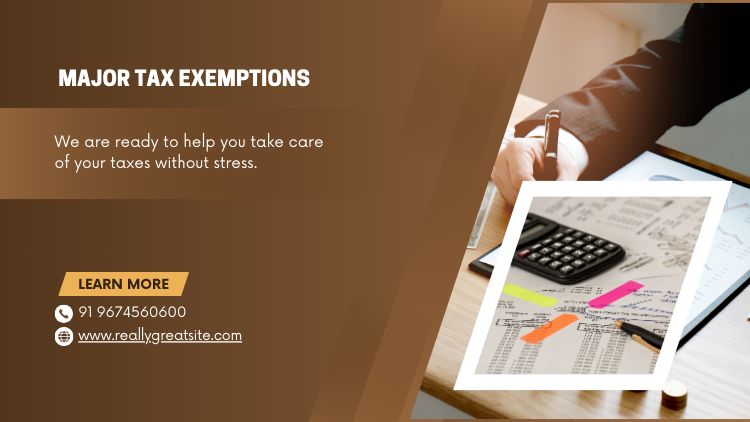Understanding and utilizing tax exemptions and deductions is a crucial step toward optimizing your tax liability. These provisions, offered under the Income Tax Act, of 1961, can significantly reduce the amount of tax you owe, leaving you with more disposable income. To calculate your income tax accurately and efficiently, you can use the AY 2024-2025 offered by Startup Station, available anytime and anywhere.
Understanding Deductions vs. Exemptions
Deductions:
Deductions are specific expenses or investments that you can subtract from your total income. This lowers the quantity of income that is liable for taxes. Common deductions include contributions to retirement accounts, medical expenses, and mortgage interest. By claiming deductions, you can effectively lower your taxable income and, in turn, your tax liability.
Exemptions:
Exemptions are specific types of income that are not included in your taxable income at all. These are essentially amounts that the government allows you to exclude from your income for tax purposes. Examples of exemptions include House Rent Allowance (HRA), Leave Travel Allowance (LTA), and certain agricultural income. By utilizing exemptions, you can directly reduce the amount of income that is taxed, leading to lower tax payments.
Common Income Tax Deductions
-
Home Loan Interest (Section 24): This deduction allows homeowners to reduce their taxable income by the amount of interest paid on their home loan. The deduction limit varies depending on whether the property is self-occupied (up to ₹2 lakh) or rented out (no upper limit).
-
Investments Under Section 80C: This section provides a wide range of deductions for different investments and costs, such as donations to the Public Provident Fund (PPF), Employee Provident Fund (EPF), Equity Linked Savings Schemes (ELSS), National Savings Certificate (NSC), and tuition fees for children. The maximum deduction allowed under Section 80C is ₹1.5 lakh per financial year.
-
Medical Insurance Premiums (Section 80D): This deduction allows you to claim premiums paid for health insurance policies covering yourself, your spouse, dependent children, and parents. The deduction limit varies depending on the age of the insured.
-
Charitable Donations (Section 80G): This section encourages charitable giving by allowing deductions for donations made to specified organizations. The reduction in amount varies according to the recipient organization and kind of donation.
Common Income Tax Exemptions
-
House Rent Allowance (HRA): This exemption benefits salaried individuals who live in rented accommodations. The amount of HRA exemption you can claim depends on the HRA received, the actual rent paid, and the city you live in.
-
Leave Travel Allowance (LTA): This exemption covers the cost of travel tickets for domestic trips taken by you, your spouse, children, dependent parents, and siblings. The exemption is subject to certain conditions and limits.
-
Children's Education Allowance: While not a specific allowance, you can claim tax exemptions on children's education expenses under Section 10(14) of the Income Tax Act. This includes deductions for Children's Education Allowance (CEA) and Hostel Expenditure Allowance (HEA).
Proactive Tax Planning: Tips to Lower Your Tax Bill
Taking a proactive approach to your taxes can result in substantial savings. Here are some key tips to minimize your tax liability:
-
Maximize Section 80C: Utilize the full ₹1.5 lakh limit by investing in tax-saving instruments like PPF, ELSS, and life insurance premiums.
-
Claim Medical Expenses: Don't forget to claim deductions for medical insurance premiums and eligible medical expenses for yourself and your family under Section 80D.
-
Donate to Charity: Contribute to approved charitable organizations to not only support worthy causes but also enjoy deductions under Section 80G.
-
Plan Your Investments: Strategically time your investments to maximize tax benefits. Consider options like ELSS mutual funds for potential growth and tax savings.
-
Maintain Records: Keep meticulous records of your expenses and investments to ensure smooth filing and avoid missing out on potential deductions.
-
Seek Professional Advice: Consult a tax advisor or financial planner for personalized guidance on tax planning and optimization strategies tailored to your specific financial situation.
By incorporating these tips into your financial planning, you can proactively manage your taxes and potentially reduce your tax burden significantly. Remember, effective tax planning is an ongoing process that requires regular review and adjustments to ensure you're making the most of available deductions and exemptions.
Conclusion
By properly employing the different deductions and exemptions available under the Income Tax Act, you may dramatically lower your tax burden and improve your financial planning. It is important to maintain proper documentation and consult a tax professional if needed to ensure you are maximizing your tax benefits. Remember, to simplify the process of calculating your income tax, consider using the Income Tax Calculator AY 2024-2025 provided by Startup Station. It's a user-friendly tool that can help you stay on top of your taxes and make informed financial decisions. For personalized assistance with your tax planning and to make the most of available deductions and exemptions, contact Startup Station today.




